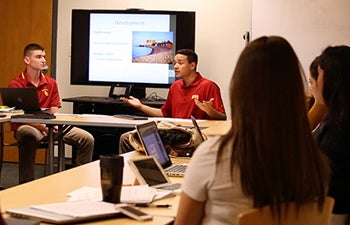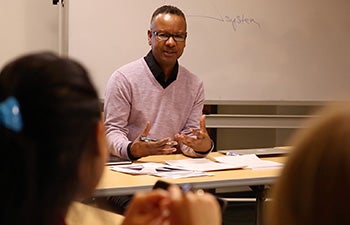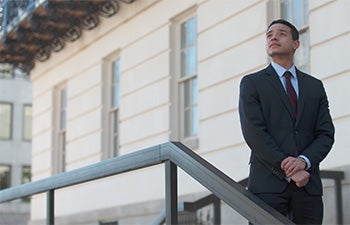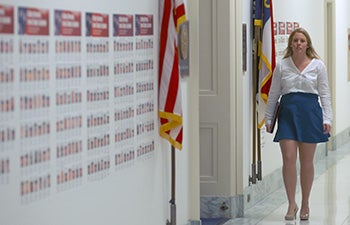Opening D.C.’s Doors
Sophomore Kara Junttila was delighted when an article she had co-authored on the nuclear budget was published recently on Roll Call, a major online source for legislative and political news on Capitol Hill. An intern at the Stimson Center, a nonprofit, nonpartisan global security think tank based in Washington, D.C., Junttila wrote the article with Stimson’s co-founder, Barry Blechman.
Junttila is among the USC undergraduates participating in the USC Dornsife Washington, D.C. Program’s inaugural semester. Led by Jeffrey Fields, assistant professor of the practice of international relations, the program enables students to spend a semester in the nation’s capital, where they split their time between coursework and internships. Open to students from all majors, the program launched this Spring.
“The Stimson Center is great about allowing us to publish something internally on its website, but when I started the Dornsife in Washington, D.C. Program I definitely didn’t expect to be published in any kind of external publication like Roll Call,” Junttila said.
The opportunity to write the article with Blechman arose when the senior researcher initially slated to work on the piece had to withdraw due to other commitments. Junttila stepped up to the mark, researching the topic and writing a first draft of the article.
“It was very exciting for me and an incredible addition to my resume, as well as a wonderful opportunity to explore this topic and work with someone who is truly an expert in the field,” she said.

Senior Roque Valiente makes a point during a classroom discussion. Photo by Mira Zimet.
This sort of opportunity exemplifies how this immersive program brings practical politics to life here for students in D.C., said Fields, a former senior adviser to the U.S. Department of Defense who brings years of experience at the highest level of government to his leadership of the program.
“This vibrant, dynamic city offers a fantastic working and learning environment for students who are interested in policy and politics,” he said. “They are able to attend congressional hearings and events at think tanks, where they can hear from leading scholars, policy makers and practitioners.”
Taught by practitioners with extensive real-world experience who are all experts in their respective fields, the program comprises three international relations courses on American foreign policy, espionage and intelligence, and contemporary international politics. The latter incorporates three modules: the geopolitics of energy, the Middle East and regional issues in Africa. The course on American foreign policy is taught by Fields.
“Professor Fields stresses that D.C. is a town where you need connections,” said Dan Morgan-Russell, a junior majoring in international relations and the global economy. “The value of the professors teaching the program is that they have all spent considerable time in this town and all have connections here.”
Such connections allowed the program faculty to bring in a wide range of high-level foreign policy experts as speakers.
“The greatest thing this program has provided is the people they have been able to bring in to talk to us — people who are making the laws we are learning about back on campus at USC,” said Morgan-Russell. “Some talks with policy makers have been off the record. In those sessions they give us the real deal on how foreign policy is actually made. Since it’s off the record you are not going to get it anywhere else. You have to be here.”
“These practitioners and policymakers add a flavor of real-world experience,” Fields said. “Students get a chance to interact directly with them, ask questions and hear their experience firsthand. This is a wonderful supplement to the textbook classroom experience.”

Jeffrey Fields, assistant professor of the practice of international relations, brings years of experience at the highest level of government to his leadership of the Dornsife in Washington, D.C. Program. Photo by Mira Zimet.
Students also complete an internship with one of Washington’s many policy-focused organizations, including government agencies, non-governmental organizations, advocacy groups, think tanks, consulting firms and congressional offices.
“Students came with a variety of interests and I worked with them to place them in internships I thought would be the best fit for them,” said Fields, who earned his Ph.D. in international relations from USC Dornsife in 2007.
Taylor Bower, a double major in political science and international relations, has nurtured a passion for politics since she ran to represent her fifth grade class in student government. Now on course to graduate in December 2015, she is a legislative intern for a congressman in the U.S. House of Representatives.
“I thought it would be a lot of paper pushing and busy work, but I get to go to policy briefings, take reports and write letters to constituents,” she said. “I’ve even gotten to write a couple of vote recommendations.
“I love it. It’s been the greatest experience I’ve ever had.”
Bower said she aims to stay on in D.C. over the summer to work in political consultancy. After graduating she hopes to return to the Hill.
“It’s such an exciting place to work. It’s very challenging in many ways, because you don’t know what’s going to happen, but it’s thrilling.”
Roque Valiente, a senior majoring in international relations and the global economy, is interning in the Executive Office of the President in the Office of the United States Trade Representative. There he is working on the proposed TransPacific Partnership (TPP).

Roque Valiente is interning in the Executive Office of the President in the Office of the United States Trade Representative. Photo by Patrick O’Donnell.
“The TPP is crucial to our economy,” Valiente said. “I research manufacturing and production rates in specific areas, interpret that data and then write reports to garner Congressional support from house representatives and senate members. I get to draft the kind of information that compels them to vote on policy.”
Originally a mathematics and economics major, Valiente decided to add international relations last year. “It’s proven to be one of the greatest decisions in my college career and coming to D.C. has been the cherry on top,” he said.
“Coming out here has really reinforced what I am passionate about. It’s empowering. I couldn’t think of a better way to end my four years in college.”
As part of the program, students explored the Library of Congress, toured the West Wing and visited the Pentagon where they were granted admittance to “the tank.” Very few people outside the close knit circle of the Joint Chiefs of Staff are allowed to enter this room, officially known as the J.C.S. Conference Room, where the chairman has convened weekly meetings since 1947.
Another highlight was a visit to the International Spy Museum, a privately owned museum dedicated to the tradecraft, history and contemporary role of espionage.
Valiente said that prior to coming to D.C., he had little understanding of the intelligence community.
“I never thought I would learn about the CIA and the FBI and their investigations,” he said. “It’s something you hear about in movies, so to actually take a class by trained professionals who have had experience in the field is unmatched.”
One of the program’s greatest strengths, Fields said, is the opportunity it offers for dynamic discussion.
“This group of students is extraordinarily diverse in terms of their majors, interests and political leanings,” he said. “All this leads to a rich and lively experience with fruitful discussions in which we hear from a wide variety of viewpoints.”

Taylor Bower walks down the hallway of the U.S. House of Representatives where she is an intern. Photo by Patrick O’Donnell.
Bower agreed. “No matter what your political opinion is you definitely have your opportunity to voice it,” she said.
Fields, who said it’s been a terrific experience watching the students flourish in Washington, plans to expand the program in the coming years, adding courses in economics and political science. As 2016 is a presidential election year, next year’s program will offer a course on campaign strategies and elections and a course on the presidency.
Morgan-Russell, who is interning at the Woodrow Wilson International Center for Scholars, has found the program’s blend of coursework, internships and field trips has positioned him to make a difference as he looks ahead toward a future career.
“There is no other city where I can learn the same kinds of things about the way the world works, where I can take classes in the evening after coming back from a high-level talk with policy makers and where I can work with scholars who are actively studying these problems and who are going to present policy recommendations to policy makers,” he said.
“I actually feel like I’m having a small impact on how foreign policy is made in this city, and thus in this country. I’m also learning how I can turn a small impact today to hopefully a bigger impact tomorrow.”